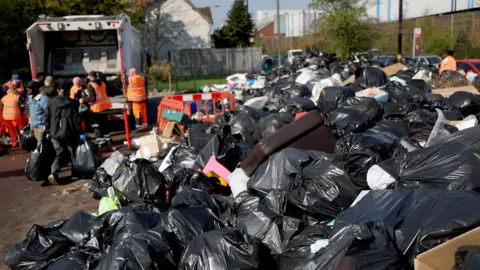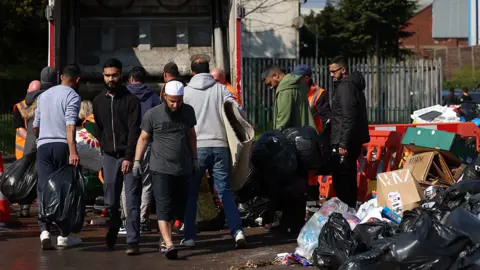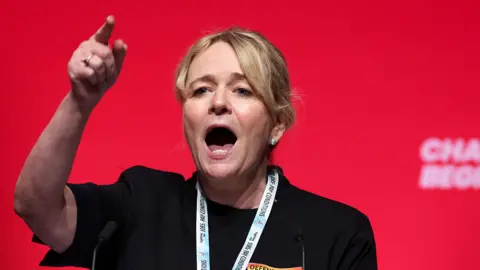Union bosses held up Birmingham bin deal, BBC told
 EPA
EPAA deal between striking bin workers and Birmingham City Council could have been reached were it not for the interventions of the Unite union's national leadership team, the BBC has been told.
A message seen by the BBC also appears to suggest some local union members are dissatisfied with how the dispute has been handled.
Unite said claims national union figures had scuppered a potential deal were "entirely without merit".
Speaking on a visit to Birmingham on Thursday, Deputy Prime Minister Angela Rayner urged the union to accept what she said was a "significantly improved" offer from the council.
Thousands of tonnes of rubbish have built up on the city's streets over more than four weeks and Ms Rayner said the situation was "causing misery and disruption to residents".
A number of senior Labour figures outside the council, including some MPs, said they understood the purported deal with local reps would have been reached during the rolling strike in January and February.
However, individuals with knowledge of the situation said while the alleged deal was backed by refuse workers at two of Birmingham City Council's three bin lorry depots, National Unite figures were involved at the third site where it was rejected.
Sources, including some with extensive union experience, say the handling of the dispute is being influenced by power struggles within Unite.
A longstanding Unite member from the West Midlands told the BBC that while commissioners at the council bore some of the responsibility for the dispute, the regional office of Unite was unhappy it had been bypassed.
They said: "Unions traditionally have been about the art of the deal on behalf of their members. Instead, Unite and some others seem to be in the grip of people for whom disruption, disputes and revolution are their priority."
 EPA
EPAThe industrial action, which began in January and escalated to an all-out walkout in March, has seen hundreds of Birmingham's refuse workers on strike.
It centres on the loss of a job role that bin workers describe as "safety-critical", which Unite said would affect about 150 workers and mean a cut of up to £8,000 a year for some and the loss of pay progression for hundreds of others.
Birmingham council says the post does not exist at other authorities and disputes both the number of staff affected and the sum of money involved.
Councillors have previously said that no worker "need lose a penny".
Ms Rayner, who is also Communities Secretary, said she wanted to see "a fair resolution to this" and added: "I would urge Unite to suspend the action and accept the improved deal."
She said the council had "moved significantly to meet the demands of the workers so we can see an end to this dispute".
She also said the backlog "must be dealt with quickly to address public health risks".
After weeks of stalemate, on 31 March the Labour-run council declared a major incident, citing the accumulation of an estimated 17,000 tonnes of rubbish on city streets.
At the same time, a leaked letter from Unite's General Secretary Sharon Graham to Deputy Prime Minister Angela Rayner referred to local negotiations as having descended into "farce".
Laying the blame at the feet of government commissioners currently overseeing Birmingham council's financial recovery, Graham said: "Every attempt being made to solve the dispute by Unite negotiators in the room, is being met with 'a computer says no' answer."
 Reuters
ReutersIn a statement on Thursday, a spokesperson for Unite said it was "outrageous that those with a political axe to grind are trying to score cheap points by attacking Unite members, who are fighting against these brutal wage cuts".
They said the union made no apology for "defending workers from paying the price for mistakes made by politicians".
"Birmingham's refuse workers will have their union's total backing for as long as it takes," they added.
"It is clear that in ballot after ballot workers have rejected losing up to £8,000 in pay with no pay protection. Maybe that should focus people's minds."
As residents' frustrations have increased about the situation, focus fell on the tactics being used by picketers and demonstrators to delay non-striking crews and their wagons from leaving depots.
Within a day of a visit from local government minister Jim McMahon, there was a change in policing tactics. Striking workers told the BBC they had been threatened with arrest if they continued to delay vehicles.
This appeared to coincide with a fresh impetus in talks between the two sides. The BBC understands talks took place over the weekend and continued into Monday and Tuesday.
Follow BBC Birmingham on BBC Sounds, Facebook, X and Instagram.

Sign up for our Politics Essential newsletter to keep up with the inner workings of Westminster and beyond.
